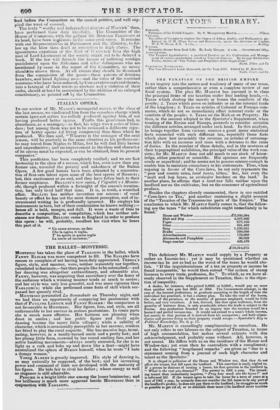ITALIAN OPERA.
IN our review of Mr. MASON'S managerial career, at the close of the last season, we vindicated him from the senseless charge which certain ignorant critics (so called) preferred against him, of not having produced better operas. Faults this gentleman had, in abundance, as a manager,—in fact, his reign was a series of blun- ders; but among them was not to be reckoned a deliberate rejec- tion of better operas (of living composers) than those which he produced. We then said, "Whoever is the manager of the next season, will be precisely in the same situation as his predecessor : he may travel from Naples to Milan, but he will find Italy barren and unproductive ; and no improvement in the class and character of its operas must be expected, or can be obtained, from its present composers." This prediction has been completely verified; and we are fast hastening to the close of a season, which has, even more than any former one, unveiled the poverty and nakedness of the Italian Opera. A few good houses have been attracted by a concentra- tion of first-rate talent upon some of the best operas of Rossixt ; but, this excitement at an end, and they have fallen back to their former emptiness. BELLINI'S new opera, I Capuleti e i Montec- chi, though produced within a fortnight of the season's termina- tion, has only lived half that time. It is, in truth, a wretched affair. BELLINI has neither invention nor science : of vocal beauty or effect he has not the most distant perception, and of in- strumental writing he is profoundly ignorant. He employs his instruments in turn, hitt of their combination he knows nothing ;— hence all is bald, meagre, and dull. It were a waste of time to describe a composition, or compilation, which has neither sub- stance nor feature. Bantam came to England in order to produce this opera : he will, probably, recollect his visit when he hears this part of it.
"Uri name avverso, un tato Che la ragion ti toglie, T' ha spinto in queste soglie La morte ad incontrar."




















 Previous page
Previous page